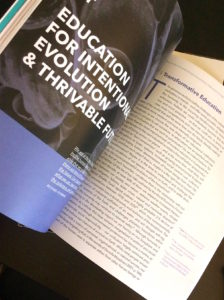Educational Ecosystems for Societal Transformation
Academy Fellow, Joshua Cubista, is an international experiential designer, facilitator, and strategist. This month Joshua co-authored and published the Global Education Futures Report: Educational Ecosystems for Societal Transformation.
We paradoxically live in the midst of accelerating global complex socio-ecological challenges while at the same time we are immersed in a windfall of increasingly vibrant human innovation and ingenuity the world over. In a time of exponential change, education as a primary contributor to the development of human culture is one of the few human areas of endeavor that is still primarily designed for the world of yesterday rather the future we are living into today.
In fields such as technology, engineering, design, science, or healthcare, innovation is highly rewarded and methods in many fields are evolving incredibly quickly. In conventional education systems, however, innovation is largely seen as a risk or even a threat. Innovative teachers, school, students, families and communities are not yet being rewarded or supported as they could be for evolving learning processes as quickly as 21stcentury complexities demand.
In the face of growing global trends such as: digitalization, automation, demographic shifts, the needed transformation of social institutions to blend local and global dynamics, and the necessity for humanity to transition to sustainable futures all call for a renaissance in our education systems around the world. Simply said, education must evolve to meet the needs of life-long learners and leaders of today and tomorrow.
These contextual reflections set the stage and are the inspiration for the work I am engaged in with an initiative called Global Education Futures. Our work is dedicated to collaboratively designing, prototyping and evolving educational systems worldwide. Originating in Russia our work now includes 8+ years of action research, projects, and rapid foresight forums with over 500 educational innovators and work across 50 countries. As a “think-link-do tank”, we are now engaged in moving from vision building into collaborative work dedicated to systems change.
As we move into the next phase of our work a core team of collaborators and I recently published the Global Education Futures Report: Educational Ecosystems for Societal Transformation.

In the report we articulate a vision for the future of education, reflect upon our research to date, and share perspectives from educational leaders around the world. Throughout the report, we explore such topics as:
- A paradigm-shift taking place in education systems around the world toward addressing 21st century complexities
- Transitioning towards learner centered education
- Urban learning spaces and regenerative lifelong learning
- The new horizon of educational ecosystems
- And, catalysts for change: a new role for schools and universities
As Peter Senge, eloquently articulated in the report forward: “One of the defining features of the modern age is the gap between our impact and our commitment: while our impacts on the natural and social world are without precedent, if anything we are more and more focused on the short term and on self-benefit versus benefit for others and life more broadly… Of all society’s core institutions, education broadly conceived has the greatest potential to close this gap”.
Throughout the report, we suggest that in our global context of increasing social, ecological, and economic complexity, our educational systems must evolve to meet the demands of the future. While there are many visions of possible futures to be explored, utopian scenarios that are unattainable or dystopian futures that are undesirable; we believe that protopian learning and leadership through which we contribute each day toward creating the world we wish to see is where our hopes for the future are best placed.
Based upon our research, we believe in order for humanity to co-create desirable futures that are congruent with 21stcentury complexities, it is necessary to re-imagine the purpose and the design of education systems. What we believe is needed is nothing less than a paradigm shift in how we learn together so we can collaboratively co-create a future that works for all of humanity and our biosphere.
To download your free copy of the report, please visit: http://futuref.org/educationfutures
To learn more about Global Education Futures your can finds us at: https://www.edu2035.org


